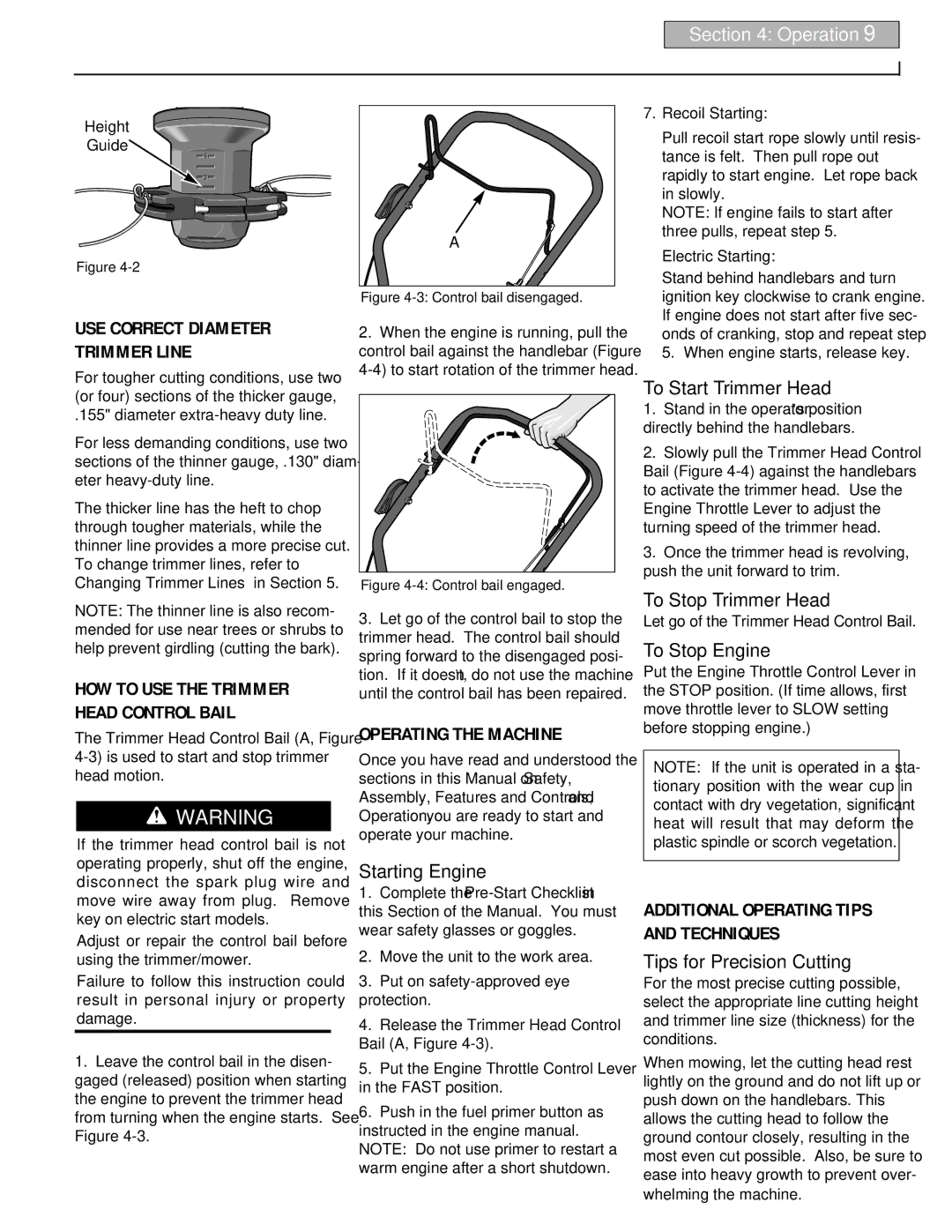
Section 4: Operation 9
Height |
Guide |
Figure
USE CORRECT DIAMETER TRIMMER LINE
For tougher cutting conditions, use two (or four) sections of the thicker gauge,
.155" diameter extra-heavy duty line.
For less demanding conditions, use two sections of the thinner gauge, .130" diam- eter
The thicker line has the heft to chop through tougher materials, while the thinner line provides a more precise cut. To change trimmer lines, refer to Changing Trimmer Lines in Section 5.
NOTE: The thinner line is also recom- mended for use near trees or shrubs to help prevent girdling (cutting the bark).
HOW TO USE THE TRIMMER HEAD CONTROL BAIL
The Trimmer Head Control Bail (A, Figure
WARNING
If the trimmer head control bail is not operating properly, shut off the engine, disconnect the spark plug wire and move wire away from plug. Remove key on electric start models.
Adjust or repair the control bail before using the trimmer/mower.
Failure to follow this instruction could result in personal injury or property damage.
1.Leave the control bail in the disen- gaged (released) position when starting the engine to prevent the trimmer head from turning when the engine starts. See Figure
A
Figure 4-3: Control bail disengaged.
2.When the engine is running, pull the control bail against the handlebar (Figure
Figure 4-4: Control bail engaged.
3.Let go of the control bail to stop the trimmer head. The control bail should spring forward to the disengaged posi- tion. If it doesn’t, do not use the machine until the control bail has been repaired.
OPERATING THE MACHINE
Once you have read and understood the sections in this Manual on Safety, Assembly, Features and Controls, and Operation, you are ready to start and operate your machine.
Starting Engine
1.Complete the
2.Move the unit to the work area.
3.Put on
4.Release the Trimmer Head Control Bail (A, Figure
5.Put the Engine Throttle Control Lever in the FAST position.
6.Push in the fuel primer button as instructed in the engine manual. NOTE: Do not use primer to restart a warm engine after a short shutdown.
7.Recoil Starting:
Pull recoil start rope slowly until resis- tance is felt. Then pull rope out rapidly to start engine. Let rope back in slowly.
NOTE: If engine fails to start after three pulls, repeat step 5.
Electric Starting:
Stand behind handlebars and turn ignition key clockwise to crank engine. If engine does not start after five sec- onds of cranking, stop and repeat step 5. When engine starts, release key.
To Start Trimmer Head
1.Stand in the operator’s position directly behind the handlebars.
2.Slowly pull the Trimmer Head Control Bail (Figure
3.Once the trimmer head is revolving, push the unit forward to trim.
To Stop Trimmer Head
Let go of the Trimmer Head Control Bail.
To Stop Engine
Put the Engine Throttle Control Lever in the STOP position. (If time allows, first move throttle lever to SLOW setting before stopping engine.)
NOTE: If the unit is operated in a sta- tionary position with the wear cup in contact with dry vegetation, significant heat will result that may deform the plastic spindle or scorch vegetation.
ADDITIONAL OPERATING TIPS AND TECHNIQUES
Tips for Precision Cutting
For the most precise cutting possible, select the appropriate line cutting height and trimmer line size (thickness) for the conditions.
When mowing, let the cutting head rest lightly on the ground and do not lift up or push down on the handlebars. This allows the cutting head to follow the ground contour closely, resulting in the most even cut possible. Also, be sure to ease into heavy growth to prevent over- whelming the machine.
